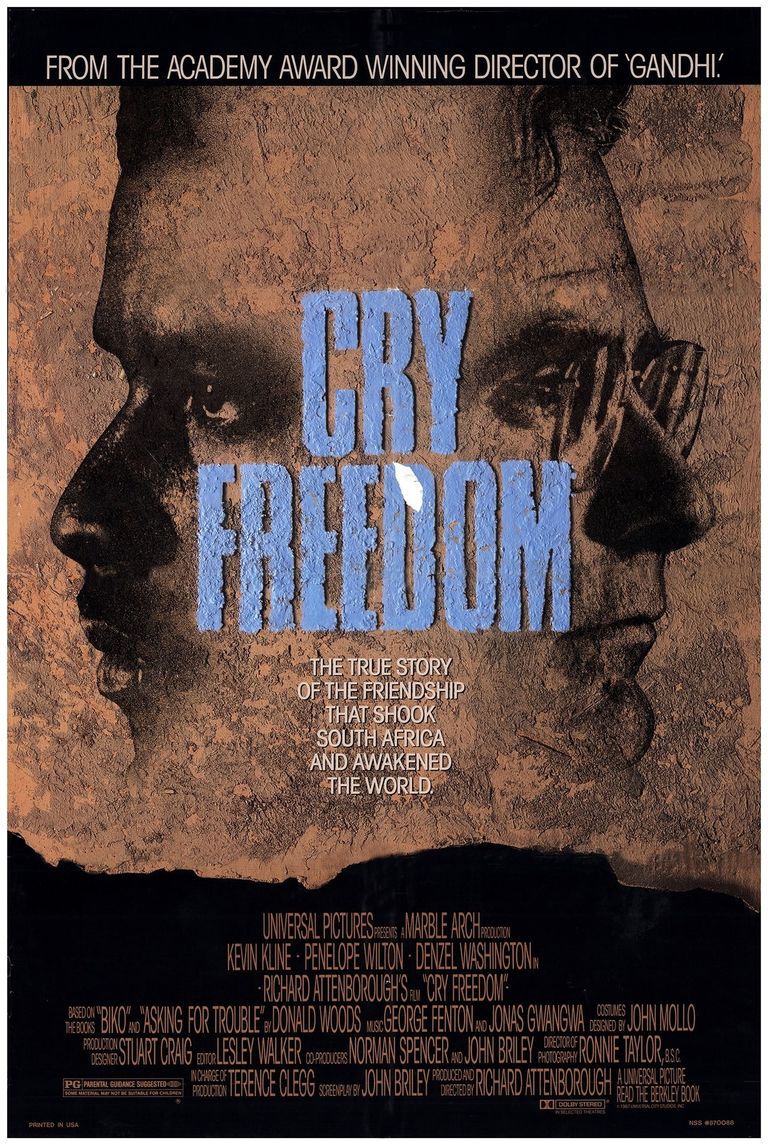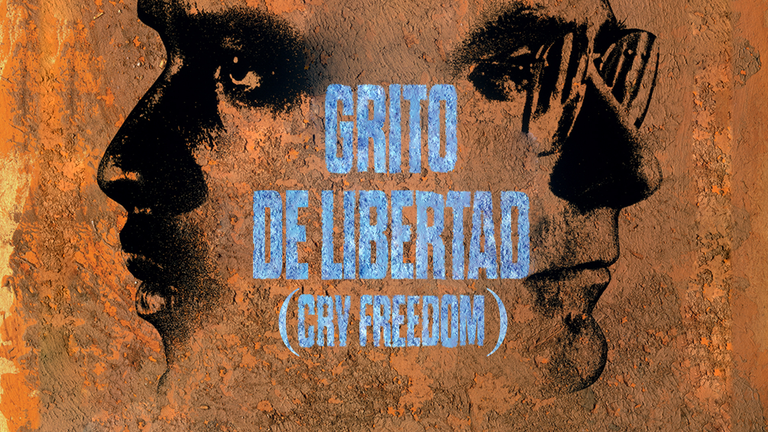
Cry Freedom is a 1987 film directed by Richard Attenborough.

The film is set in South Africa in the 1970s and tells the true story of the friendship and common struggle between the white journalist Donald Woods and the black activist of Black Consciousness, Steve Biko.
The singer Peter Gabriel dedicated a video to it, arranging his song Biko from 1980, with some scenes from the film in which, however, he is absent.

Cry Freedom (en España: Grita libertad, en Hispanoamérica: Grito de libertad) es una película de 1987 dirigida por Richard Attenborough.
La película está ambientada en la Sudáfrica de los años 1970 y cuenta la historia real de la amistad y la lucha común entre el periodista blanco Donald Woods y el activista negro de la Conciencia Negra Steve Biko.
El cantante Peter Gabriel le dedicó un vídeo arreglando su canción Biko de 1980, con algunas escenas de la película en las que, sin embargo, está ausente.

Since 1948, the oppressive policy known as "apartheid" began to be implemented in South Africa. The Afrikaners (the descendants of those Dutch colonists - the Boers - who in the 19th century had practically built the country) segregated blacks in real ghettos, brutally precluding any possibility of pluralism and collaboration. For the brave who defend their civil rights, there are police raids, torture and exile.
Biko, a young doctor, is the charismatic man of the South African blacks, founder of the Black Consciousness Movement. He too, after various arrests and interrogations, has been banned within the few square miles of the District where he lives with his wife and two young children. It is this character, a preacher of non-violence and racial integration, that interests Donald Woods, owner and director of a progressive newspaper.
Woods (who is a "liberal"), at first a little skeptical about Biko's action, meets him secretly for the first time and little by little mutual respect and a strong friendship bind the two. Woods makes his newspaper the mouthpiece of the just demands of the blacks: when Biko is arrested and tortured and then dies in prison (September 1977), Woods, knowingly exposing himself to the worst, will run serious risks. His family - his wife Wendy and five children - are insulted and disturbed.
Woods, who is also banished and exiled with his family to a residence far from the city where he works, has no choice but to make a painful decision: to flee to England and there publish two books on Biko and his political program, to keep his message alive and current. Leaving South Africa will, however, be a real adventure.
Thanks to his many black friends, false passports, and the cassock procured for him, Donald Woods manages to pass through Leshoto from where, joined by his family by car, he will then leave by plane for London, and here he will be able to publish the manuscript on the life of his South African friend, who died for his ideals of progress and peace.

A partir de 1948 se comenzó a implementar en Sudáfrica la política opresiva conocida como “apartheid”. Los afrikaners (los descendientes de aquellos colonos holandeses -los bóers- que prácticamente construyeron el país en el siglo XIX) segregan a los negros en verdaderos guetos, excluyendo brutalmente cualquier posibilidad de pluralismo y colaboración. Para los valientes que defienden sus derechos civiles, hay redadas policiales, tortura y exilio.
Biko, un joven médico, es el hombre carismático de los negros sudafricanos, fundador del Movimiento de la Conciencia Negra. A él también, después de varios arrestos e interrogatorios, se le prohibió la entrada a los pocos kilómetros cuadrados del distrito donde vive con su esposa y sus dos hijos pequeños. Es este personaje, predicador de la no violencia y de la integración racial, el que interesa a Donald Woods, propietario y director de un periódico progresista. Woods (que es un "liberal"), inicialmente un poco escéptico sobre las acciones de Biko, se encuentra con él en secreto por primera vez y poco a poco el respeto mutuo y una firme amistad los unen.
Woods hace de su periódico el portavoz de las justas reivindicaciones de los negros: cuando Biko es arrestado y torturado y luego muere en prisión (septiembre de 1977), Woods, exponiéndose conscientemente a lo peor, correrá graves riesgos. Su familia, su esposa Wendy y sus cinco hijos, se sienten insultados y perturbados. Woods, a su vez desterrado y exiliado con su familia a una residencia alejada de la ciudad donde trabaja, se queda con una dolorosa decisión: huir a Inglaterra y publicar allí dos libros sobre Biko y su programa político, para mantenerlo vivo y el El mensaje es actual.
Sin embargo, abandonar Sudáfrica será una verdadera aventura. Gracias a muchos amigos negros, a pasaportes falsos y a la sotana que le proporcionaron, Donald Woods consigue pasar a Leshoto, desde donde, acompañado por su familia en el coche, partirá en avión hacia Londres, donde podrá publica el manuscrito sobre la vida de un amigo sudafricano, que murió por sus ideales de progreso y paz.

Kevin Kline: Donald Woods
Denzel Washington: Steve Biko
Kevin McNally: Ken
John Thaw: Jimmy Kruger
Penelope Wilton: Wendy Woods
Josette Simon: Dr. Mamphela Ramphele

Kevin Kline: Donald Woods
Denzel Washington: Steve Biko
Kevin McNally: Ken
John ThawJimmy Kruger
Penélope Wilton como Wendy Woods
Josette Simon: Dra. Mamphela Ramphele
Awards and recognitions / Premios y reconocimientos.
1988 - Academy Award
Nomination Best Supporting Actor Denzel Washington
Nomination Best Original Score George Fenton and Jonas Gwangwa
Nomination Best Song (Cry Freedom) George Fenton and Jonas Gwangwa
1988 - Golden Globe
Nomination Best Motion Picture - Drama
Nomination Best Director Richard Attenborough
Nomination Best Actor in a Motion Picture - Drama Denzel Washington
Nomination Best Original Score George Fenton and Jonas Gwangwa
1988 - BAFTA Award
Best Sound Jonathan Bates, Simon Kaye and Gerry Humphreys
Nomination Best Film Richard Attenborough
Nomination Best Director Richard Attenborough
Nomination Best Supporting Actor John Thraw
Nomination Best Cinematography Ronnie Taylor
Nomination Best Editing Leslie Walker
1988 - Berlin Film Festival
Peace Prize Richard Attenborough

1988 - Premio Óscar
Nominación a Mejor Actor de Reparto para Denzel Washington
Nominación a mejor banda sonora para George Fenton y Jonas Gwangwa
Nominada Mejor Canción (Cry Freedom) para George Fenton y Jonas Gwangwa
1988 - Globos de Oro
Nominación Mejor Película Dramática
Nominación a Mejor Director: Richard Attenborough
Nominación a Mejor Actor de Drama: Denzel Washington
Nominación a mejor banda sonora para George Fenton y Jonas Gwangwa
1988 - Premio BAFTA
Mejor sonido para Jonathan Bates, Simon Kaye y Gerry Humphreys
Nominación a Mejor Película para Richard Attenborough
Nominación a Mejor Director: Richard Attenborough
Nominación a Mejor Actor de Reparto para John Thraw
Nominación a Mejor Fotografía para Ronnie Taylor
Nominación a mejor montaje para Leslie Walker
1988 - Festival de Cine de Berlín
Premio de la Paz a Richard Attenborough

Political commitment, historical page, denunciation: Richard Attenborough tries to repeat the success of his Gandhi (same screenwriter, John Briley), adopts a fairly realistic approach and an elegant staging, with convincing actors and emotional passages (especially the gripping final escape).
His, however, is not a cry but a whisper aimed at sensitizing the viewer, argued with speeches and emblematic situations: on the one hand, therefore, it does not ride the easy sensationalism, on the other it loses more than one opportunity of necessary vehemence, in the oxymoron of dignified indignation.

Compromiso político, página histórica, denuncia: Richard Attenborough intenta repetir el éxito de su Gandhi (mismo guionista, John Briley), adopta un enfoque bastante realista y una puesta en escena elegante, con actores convincentes y pasajes emocionantes (especialmente la apasionante fuga final).
El suyo, sin embargo, no es un grito sino un susurro destinado a sensibilizar al espectador, argumentado con discursos y situaciones emblemáticas: por un lado, por lo tanto, no se deja llevar por el sensacionalismo fácil, por otro, pierde más de una oportunidad para lo necesario. vehemencia, en el oxímoron de la indignación digna.

Source images / Fuente de las imágenes: IMDB.
Thanks for reading!!! / Gracias por leer!!!
Fuentes de los separadores de texto / Source divider text:


Upvoted. Thank You for sending some of your rewards to @null. Get more BLURT:
@ mariuszkarowski/how-to-get-automatic-upvote-from-my-accounts@ blurtbooster/blurt-booster-introduction-rules-and-guidelines-1699999662965@ nalexadre/blurt-nexus-creating-an-affiliate-account-1700008765859@ kryptodenno - win BLURT POWER delegationNote: This bot will not vote on AI-generated content
Thanks!